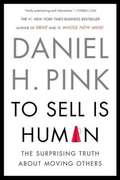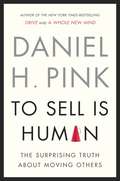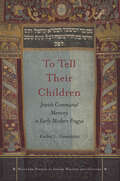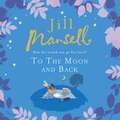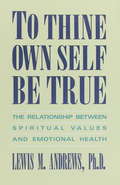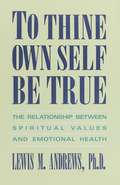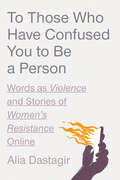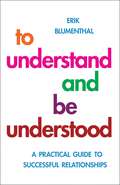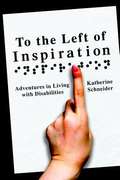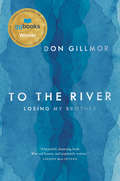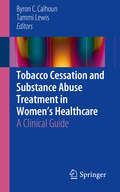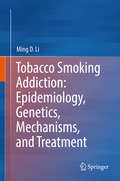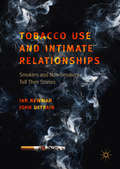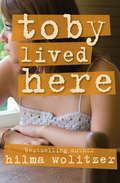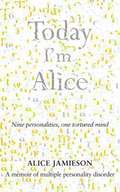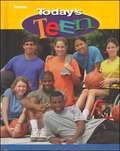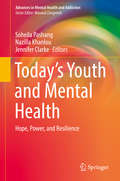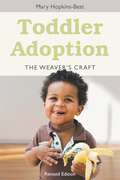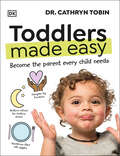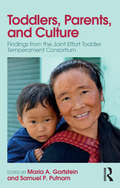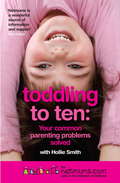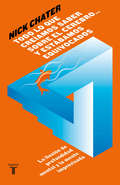- Table View
- List View
To Sell Is Human: The Surprising Truth About Moving Others
by Daniel H. PinkLook out for Daniel Pink&’s new book, When: The Scientific Secrets of Perfect Timing#1 New York Times Business Bestseller #1 Wall Street Journal Business Bestseller #1 Washington Post bestsellerFrom the bestselling author of Drive and A Whole New Mind, and teacher of the popular MasterClass on Sales and Persuasion, comes a surprising--and surprisingly useful--new book that explores the power of selling in our lives. According to the U.S. Bureau of Labor Statistics, one in nine Americans works in sales. Every day more than fifteen million people earn their keep by persuading someone else to make a purchase. But dig deeper and a startling truth emerges: Yes, one in nine Americans works in sales. But so do the other eight. Whether we&’re employees pitching colleagues on a new idea, entrepreneurs enticing funders to invest, or parents and teachers cajoling children to study, we spend our days trying to move others. Like it or not, we&’re all in sales now. To Sell Is Human offers a fresh look at the art and science of selling. As he did in Drive and A Whole New Mind, Daniel H. Pink draws on a rich trove of social science for his counterintuitive insights. He reveals the new ABCs of moving others (it's no longer "Always Be Closing"), explains why extraverts don't make the best salespeople, and shows how giving people an "off-ramp" for their actions can matter more than actually changing their minds. Along the way, Pink describes the six successors to the elevator pitch, the three rules for understanding another's perspective, the five frames that can make your message clearer and more persuasive, and much more. The result is a perceptive and practical book--one that will change how you see the world and transform what you do at work, at school, and at home.
To Sell Is Human: The Surprising Truth about Moving Others
by Daniel H. Pink#1 New York Times Business Bestseller, #1 Wall Street Journal Business Bestseller, #1 Washington Post bestseller. From the bestselling author of Drive and A Whole New Mind comes a surprising--and surprisingly useful--new book that explores the power of selling in our lives. According to the U. S. Bureau of Labor Statistics, one in nine Americans works in sales. Every day more than fifteen million people earn their keep by persuading someone else to make a purchase. But dig deeper and a startling truth emerges: Yes, one in nine Americans works in sales. But so do the other eight. Whether we're employees pitching colleagues on a new idea, entrepreneurs enticing funders to invest, or parents and teachers cajoling children to study, we spend our days trying to move others. Like it or not, we're all in sales now. To Sell Is Human offers a fresh look at the art and science of selling. As he did in Drive and A Whole New Mind, Daniel H. Pink draws on a rich trove of social science for his counterintuitive insights. He reveals the new ABCs of moving others (it's no longer "Always Be Closing"), explains why extroverts don't make the best salespeople, and shows how giving people an "off-ramp" for their actions can matter more than actually changing their minds. Along the way, Pink describes the six successors to the elevator pitch, the three rules for understanding another's perspective, the five frames that can make your message clearer and more persuasive, and much more. The result is a perceptive and practical book--one that will change how you see the world and transform what you do at work, at school, and at home.
To Tell Their Children: Jewish Communal Memory in Early Modern Prague
by Rachel L. GreenblattThis book offers an examination of Jewish communal memory in Prague in the century and a half stretching from its position as cosmopolitan capital of the Holy Roman Empire (1583-1611) through Catholic reform and triumphalism in the later seventeenth century, to the eve of its encounter with Enlightenment in the early eighteenth. Rachel Greenblatt approaches the subject through the lens of the community's own stories—stories recovered from close readings of a wide range of documents as well as from gravestones and other treasured objects in which Prague's Jews recorded their history. On the basis of this material, Greenblatt shows how members of this community sought to preserve for future generations their memories of others within the community and the events that they experienced. Throughout, the author seeks to go beyond the debates inspired by Yosef Hayim Yerushalmi's influential Zakhor: Jewish History and Jewish Memory, often regarded as the seminal work in the field of Jewish communal memory, by focusing not on whether Jews in a pre-modern community had a historical consciousness, but rather on the ways in which they perceived and preserved their history. In doing this, Greenblatt opens a window onto the roles that local traditions, aesthetic sensibilities, gender, social hierarchies, and political and financial pressures played in the construction of local memories.
To The Moon And Back: An uplifting tale of love, loss and new beginnings
by Jill MansellNo. 1 bestselling author Jill Mansell writes with sensitivity and optimism about love, loss and new beginnings in TO THE MOON AND BACK. Not to be missed by readers of Jojo Moyes and Veronica Henry. When Ellie Kendall tragically loses her husband she feels her life is over. But eventually she's ready for a new start - at work, that is. She doesn't need a new man when she has a certain secret visitor to keep her company... Moving to North London, Ellie meets neighbour Roo who has a secret of her own. Can the girls sort out their lives? Guilt is a powerful emotion, but a lot can happen in a year in Primrose Hill...(P)2011 Isis Publishing
To Thine Own Self Be True
by Lewis AndrewsA seminal work on ethical therapy and the vital connection between responsibility, personal values, and peace of mind. "One of the most valuable, enlightening books I have ever read. " -- Hugh Prather
To Thine Own Self Be True: The Relationship Between Spiritual Values and Emotional Health
by Lewis M. Andrews"There is a newfound confidence and enthusiasm for living. But perhaps the most remarkable development of all is the recognition that this spiritual therapy is not really a new discovery, revealed by some outside authority, as much as it is a reminder of the basic truths we have always known in our own hearts. In healing ourselves, we learn that the greatest wisdom of all lies not in listening to others but in being true to our deepest selves".
To Those Who Have Confused You to Be a Person: Words as Violence and Stories of Women's Resistance Online
by Alia DastagirAn urgently needed reckoning with the harm, harassment, and abuse women face on the Internet, complicating how we think about violence online and featuring deep reporting on how women are surviving the trauma—by an award-winning reporterWhen Alia Dastagir published a story for USA Today as part of an investigation into child sexual abuse, she became the target of an online mob launched by QAnon and encouraged by Donald Trump, Jr. While female journalists, politicians, academics, and influencers receive a disproportionate amount of online attacks because of the nature of their professions, all women online experience hate, creating profound harms for individual women and society. In To Those Who Have Confused You to Be a Person, Dastagir uses critical analysis from psychologists, sociologists, neuroscientists, technologists, and philosophers to offer a uniquely deep and intimate look at what women experience during online abuse, as well as how they cope and make meaning out of violence.Dastagir weaves together her story with those of thirteen other women, including a comedian who uses feminist humor to subvert her harassment and an ob-gyn who channels anger over her abuse to fight attacks on reproductive rights. Dastagir explores why language online cannot be ignored, how it damages bodies, when it triggers and traumatizes, and why women&’s responses are so varied. Dastagir analyzes why online abuse is perpetrated by people across the ideological spectrum and how it intersects with the dangers of disinformation. She argues that while online abuse is often framed exclusively as a problem of misogyny, it is also connected to a culture of white supremacy and the systems with which it intertwines. To Those Who Have Confused You to Be a Person is the book on online abuse for this cultural moment, when being online is a daily necessity for so many, even as we grow ever more polarized. Systemic solutions are key to combating violence online, but the narrative of reform does not help women today. This nuanced examination of what it means to effectively cope will empower women to raise their voices against the forces bent on silencing them.
To Understand and be Understood: A Practical Guide to Successful Relationships
by Erik BlumenthalThis practical guide offers a series of sure-fire strategies to those seeking to transform their personal relationships and inspire new ones. Drawing upon examples from everyday life, Erik Blumenthal's warm, anecdotal, and down-to-earth advice will change the way you look at your friends and family, and yield radical results in your interactions with those around you, creating understanding and loving relationships in all the spheres of your life. The result? A happier, more fulfilled you. The key? A new understanding of ourselves and others based on simple easy-to-use principles. A preeminent psychotherapist and analyst, lecturer, and author Erik Blumenthal Dip. Psych. (1914-2004) was President of the Swiss Society for Individual Psychology and Director of the International Committee for Adlerian Summer Schools and Institutes. He wrote a number of books on child-rearing, self-education, marriage and old age.
To Want to Learn
by Jackson KytleLack of learner motivation is the single greatest challenge before American schools and colleges. When students are self-motivated, they invest more and work harder at learning even if resources are inadequate. Jackson Kytle's provocative book argues that students and teachers waste time and human energy because the conventional curriculum rests on flawed mental models. Hope for change requires a searching critique of modernity as well as expanded theories of human motivation and learning based on advances in neurobiology and cognitive studies. After consideration of existentialism and choice of life purposes, and the dynamics of psychological involvement, Kytle closes his ambitious, interdisciplinary book with ten considerations for better learning.
To an Unknown God: Religious Freedom on Trial
by Garrett EppsThe people and issues behind a Supreme Court Case.
To the Finish Line: A World Champion Triathlete’s Guide To Your Perfect Race
by Chrissie WellingtonBeing mentored by Chrissie Wellington would be a dream for any triathlete. In To The Finish Line Chrissie presents her distilled wisdom, hard-won over the course of her extraordinary career, to give all triathletes the chance to learn from the very best.Chrissie writes with emotional honesty, and her warmth and sense of humour also shine through. She speaks frankly about her own experiences - both good and bad - from her career. Such stories will be a source of great inspiration to readers.The book will also be an invaluable practical resource for triathletes. It contains a significant amount of easily-applicable advice on subjects ranging from training tips through to mental strength, transition techniques and nutrition.
To the Left of Inspiration: Adventures in Living with Disabilities
by Katherine SchneiderWhen is the last time you've read an honest, funny book about living with disabilities? To the Left of Inspiration: Adventures in Living with Disabilities is just such a book. You'll learn from a woman blind from birth about activities of daily life, like talking to children about disabilities, traveling, going to church, and working. Great memoirs about amazing people with disabilities exist, as do hundreds of books about the diagnosis and treatment of a particular disability. There are also books for specialists about teaching, rehabilitating, or accommodating a particular kind of disability. Since the passage of the Americans with Disabilities Act, more and more people interact daily with students, customers, and clients with disabilities and want to do so knowledgeably and sensitively. The life experiences Schneider describes to exemplify her suggestions to the reader highlight the warmth and humor in all of our struggles to be humane with each other, whether we are temporarily able-bodied or disabled. Fifty-four million Americans have chronic illnesses or disabilities requiring them to make accommodations in the ways they live their lives. They have families, friends, coworkers, teachers, health care professionals, and church leaders who want to know what their disabled friend is going through and how to help. Schneider writes about living with blindness for over fifty years and fibromyalgia for ten years.
To the River: Losing My Brother
by Don GillmorAn eloquent and haunting exploration of suicide in which one of Canada's most gifted writers attempts to understand why his brother took his own life. Which leads him to another powerful question: Why are boomers killing themselves at a far greater rate than the Silent Generation before them or the generations that have followed?In the spring of 2006, Don Gillmor travelled to Whitehorse to reconstruct the last days of his brother, David, whose truck and cowboy hat were found at the edge of the Yukon River just outside of town the previous December. David's family, his second wife, and his friends had different theories about his disappearance. Some thought David had run away; some thought he'd met with foul play; but most believed that David, a talented musician who at the age of 48 was about to give up the night life for a day job, had intentionally walked into the water. Just as Don was about to paddle the river looking for traces, David's body was found, six months after he'd gone into the river. And Don's canoe trip turned into an act of remembrance and mourning. At least David could now be laid to rest. But there was no rest for his survivors. As his brother writes, "When people die of suicide, one of the things they leave behind is suicide itself. It becomes a country. At first I was a visitor, but eventually I became a citizen." In this tender, probing, surprising work, Don Gillmor brings back news from that country for all of us who wonder why people kill themselves. And why, for the first time, it's not the teenaged or the elderly who have the highest suicide rate, but the middle aged. Especially men.
Tobacco Cessation and Substance Abuse Treatment in Women's Healthcare
by Byron C. Calhoun Tammi LewisThis book is a comprehensive guide to the screening, management, and treatment of female patients with addictions. There are a range of clinical issues specific to women with substance use disorders and substance abuse during pregnancy is known to have deleterious effects on neonates. This book focuses on the effective care of the addicted patient and discusses novel outpatient therapy, therapeutic substitution, abstinence therapy, and the importance of counseling in the delivery of care. Topics include the physiology of nicotine, opiates, EtOH, and other substances of abuse; the role of receptors and neurotransmitters in addiction; the effects of tobacco and substance abuse on women' s health; and tobacco cessation methods. Featuring practical approaches to gender-responsive treatment, Tobacco Cessation and Substance Abuse in Women's Healthcare is a valuable resource for obstetricians, gynecologists, family medicine practitioners, and residents hoping to expand their knowledge of tobacco cessation and substance abuse in women's health.
Tobacco Smoking Addiction: Epidemiology, Genetics, Mechanisms, and Treatment
by Ming D. LiThis book provides the most recent knowledge on almost all key aspects of the health impact of tobacco smoking. Its 21 chapters focus on both preclinical and clinical studies. The contents are broad, covering the epidemiology of tobacco smoking; genetic epidemiology; identification of susceptibility genomic regions, genes, and pathways as determined by both human and animal studies; evolutionary relations among the different nAChR subunit genes that are so important to the nicotine response; smoking-related diseases; E-cigarettes; and smoking cessation. Furthermore, each chapter includes a detailed and comprehensive list of key references. For both clinical and basic researchers, this book is a valuable resource on nicotine dependence and other addictions.
Tobacco Use and Intimate Relationships: Smokers And Non-smokers Tell Their Stories
by Ian Newman John DeFrainThis book presents a wide variety of insights into the effects of smoking on both smokers and non-smokers. Based on extensive questionnaire surveys from across the USA, this research explores the complex dynamics of intimate relationships and how they are affected by smoking, especially with regard to honest communication. The volume delves into the battles which take place behind closed doors as both smokers and non-smokers invoke personal rights and argue their positions. Finally, the authors explore how health policy and public policy can better serve both smokers and non-smokers, and what the future may hold for the regulation of tobacco use.
Toby Lived Here
by Hilma WolitzerWhile in foster care, Toby and her sister learn what "family" really meansWhen Toby's father dies in a car accident, her mother gets a new job and a cheaper apartment. At first it seems as if everything might be all right, but soon the pressure gets to be too much. Toby's mother stops cooking, stops talking, and starts crying or laughing at random times. When she is committed to a rest home, Toby and her sister, Anne, are placed in foster care against their will.. The Selwyns are a kind couple, but nothing about their house feels like home. The artwork is tacky, the music is lame, and the kitchen table is depressing yellow Formica. But in her simple little bedroom, Toby finds a haven. As she and her sister struggle to adjust to their scary new life, she learns that family is what you make it, and home can be anywhere you feel at peace. This ebook features an illustrated biography of Hilma Wolitzer, including rare photos and never-before-seen documents from the author's personal collection.
Today I'm Alice: Nine Personalities, One Tortured Mind
by Alice JamiesonWhen Alice was a teenager, strange things started happening to her. Hours of her life simply disappeared. She'd hear voices shouting at her, telling her she was useless. And the nightmares that had haunted her since early childhood, scenes of men abusing her, became more detailed . . . more real. Staring at herself in the mirror she'd catch her face changing, as if someone else was looking out through her eyes. In Today I'm Alice, she describes her extraordinary journey from a teenage girl battling anorexia and OCD, drowning the voices with alcohol, to a young woman slipping further and further into mental illness. It was only after years lost in institutions that she was correctly diagnosed with multiple personality disorder. When her alternative personalities were revealed in therapy she discovered how each one had their own memories of abuse and a full picture of her childhood finally emerged. As she learned to live with her many 'alters', she set out to confront the man who had caused her unbearable pain. Moving and ultimately inspiring, this is a gripping account of a rare condition, and the remarkable story of a courageous woman.
Today's Teen (7th edition)
by Eddye Eubanks Joan Kelly-Plate Glencoe McGraw-Hill StaffEquip your students, grades 7-9, with the basic life skills they'll need! This updated, 7th edition provides a hands-on approach to personal development, relationship skills, managing resources, food and nutrition, clothing, housing, and more. Special feature strands throughout the text maximize student learning. Try It Out features encourage students to use their problem-solving skills. Safety First provides students with safety tips that relate to chapter content. Making a Difference features suggest ways that students can make a difference within their families, schools, or communities. How-To features offer students practical, usable information designed to enhance the development of life skills. Take Note extends text information and highlights key topics. Career Network pages offer students insight into the world of work within the various career clusters. Linking School to Career activities help students explore careers of interest.
Today’s Youth and Mental Health: Hope, Power, And Resilience (Advances in Mental Health and Addiction)
by Nazilla Khanlou Soheila Pashang Jennifer ClarkeThis book focuses on the social and intersectional determinants of mental health among youth. The innovative and cutting edge text arises out of multidisciplinary fields of academic, researchers, policy makers, practitioners, artists, and youth. Contributions from Canada, Germany, Portugal, South Korea, Burkina Faso, Afghanistan, and Jamaica addresses the complexities and the opportunities for youth across contexts. Each chapter entails an introduction to the topic, literature review and research findings, discussion, and implications in regard to research, policy, and practice. A unique aspect of the book is the inclusion of a critical response to each chapter’s content from diverse stakeholders (such as policy makers, front line workers, practitioners, community activists, artists and youth).The book is a critical and current contribution to exploring youth mental health and, specifically, the ways in which youth learn, live, and resist in a world around them. Topics examined include youth social engagement, civic integration, and political participation at multiple local, regional, and transnational levels.
Toddler Adoption: The Weaver's Craft Revised Edition
by Mary Hopkins-BestToddler Adoption looks at the unique joys and challenges of adopting and parenting a toddler. When a child aged is adopted between the ages of 12 to 36 months, they often show signs of cognitive and emotional immaturity, which can cause behavioral and relational issues. This book offers support and practical tools to help parents prepare for and support the toddler's transition between the familiar environment of their biological parent's home or foster home to a new and unfamiliar one, and considers the issues that arise at different developmental stages. It highlights the challenges that parents are likely to encounter, but also gives positive guidance on how to overcome them. Written by a specialist in children's development who is also an adoptive parent herself, this fully revised and updated edition of the go-to-source on adopting toddlers is essential reading for both parents and professionals working with adoptive families.
Toddlers Made Easy: Become the Parent Every Child Needs
by Cathryn TobinHow to transform everyday life with a toddler.Packed with friendly and helpful advice to support parents and toddlers during their trickiest moments, Dr. Tobin helps parents see matters from your toddler's point of view, with lively illustrations showing their thought patterns. Parent quizzes throughout the book help parents think about how to best handle a scenario, reflect on their own parenting background, and communicate effectively and calmly to support their child through this key developmental stage.
Toddlers, Parents and Culture: Findings from the Joint Effort Toddler Temperament Consortium
by Maria A. Gartstein Samuel P. PutnamOne doesn’t have to travel extensively to realize that there are intriguing differences in the ways in which people from different cultures tend to behave. Gartstein and Putnam explore whether these differences are shaped during the early years of life, at the moment when children are just beginning to understand how, when, and why they should express some emotions, and not others. Based on the findings of the Joint Effort Toddler Temperament Consortium (JETTC), which asked parents from 14 different countries multiple questions regarding their main goals and techniques for raising children to be successful in their culture, Gartstein and Putnam analyze how children’s characteristics (both normative and problematic) are shaped by different cultural environments. Drawing from insights in anthropology, sociology, and developmental psychology, the book explores the full spectrum of human experience, from broad sets of values and concerns that differentiate populations down to the intimate details of parent-child relationships. The results reveal a complex web of interrelations among societal ideals, parental attempts to fulfill them, and the ways their children manifest these efforts. In doing so, they provide a revealing look at how families raise their young children around the world. Toddlers, Parents, and Culture will be of great interest to students and scholars in temperament, cross-cultural psychology, parenting and socioemotional development in early childhood, as well as professionals in early education, child mental health, and behavioral pediatrics.
Toddling to Ten: Your Common Parenting Problems Solved: The Netmums Guide to the Challenges of Childhood
by Netmums Hollie Smith Siobhan FreegardHow do you avoid pyjama dramas and get a toddler to play ball at bedtime? How do you manage your child's time on the computer and kids who are couch potatoes? What do you do when your five year old starts telling lies? All the answers can be found in this comprehensive guide to coping with the challenges of childhood. A hand-selected panel of experts ranging from dentists to psychologists provide scholarly advice. But, crucially, there are hundreds of top tips and suggestions from other mums - the members of netmums.com, the rapidly-growing online community of mothers sharing valuable information on all aspects of childcare. It's real advice for real women, and is guaranteed to put the fun back into family life.
Todo lo que creíamos saber sobre el cerebro... y estábamos equivocados: La ilusión de profundidad mental y la mente improvisada
by Nick ChaterCon una interpretación radical sobre cómo funciona el cerebro, y ganador del Prose Awards 2019 en la categoría de psicología clínica, Nick Chater revela que la profundidad mental es sólo una ilusión. Asumimos que nuestras creencias y deseos surgen de las profundidades insondables de nuestra mente, y que si tuviéramos la llave para acceder a ese misterioso mundo, podríamos comprendernos en nuestra totalidad. Nick Chater llega a destruir este mito. Navegando en una nueva investigación en neurociencia, psicología del comportamiento y percepción, el especialista en comportamiento humano muestra que no existen esas profundidades para ser develadas ni tampoco el pensamiento inconsciente; sino que somos nosotros quienes generamos al instante nuestras propias ideas, motivaciones y pensamientos. Todo lo que creíamos saber sobre el cerebro... y estábamos equivocados nos lleva a descubrir, a través de ejemplos visuales y experimentos contraintuitivos, que somos los personajes de nuestra propia creación, improvisando constantemente nuestro comportamiento de acuerdo con nuestras experiencias en el pasado; y como Chater nos demuestra, reconociendo que esto puede ser liberador. «Un descubrimiento deslumbrante. Nick Chater me voló la cabeza.» Tim Harford, autor bestseller de El economista camuflado
